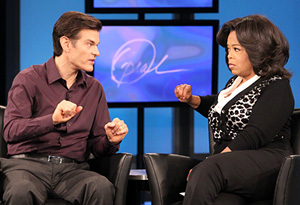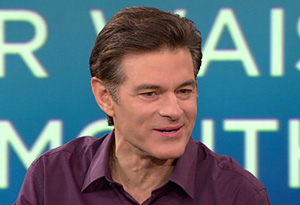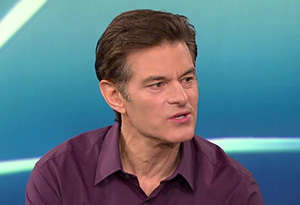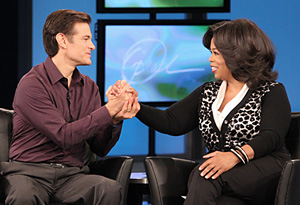5 Numbers That Can Save Your Life

You know your social security number, your PIN number or your telephone number by heart. But what about your blood pressure number? Or your cholesterol level?
To face the truth about your health, Dr. Oz says you need to know the five big numbers that drive most of how you age. "If you're an adult in America, there is no excuse for not knowing these five numbers."
The first—and most important—is your blood pressure. According to Dr. Oz, 75 million Americans suffer from high blood pressure. "It damages your heart, your brain, your kidneys," he says. "It causes impotence. So it's a big issue."
While optimal blood pressure can vary from person to person, Dr. Oz says the ideal number is 115 over 75. "As long as you're not light-headed, the lower the better," he says. "If your number is hypertensive, which is 140 over 90 or greater, you are losing about 10 years of life expectancy."
Dr. Oz says every person needs to check this number once a year. "Most people have a devastating illness hit them, and that's when they know they have high blood pressure," he says. "It is called the silent killer for a reason. Most people have a little headache—they'll feel tired even—but they won't have anything they can put their finger on and say: 'You know what? That's exactly the problem.'"
Watch Dr. Oz demonstrate how high blood pressure leads to stroke.
To lower high blood pressure, Dr. Oz recommends losing weight and reducing salt intake. "Because salt is such a big part of our diet today, and we get about 3,400 milligrams of salt a day," he says. "That's more than twice what we think you ought to get if your blood pressure's high."
Watch Dr. Oz demonstrate salt's affect on the body
To face the truth about your health, Dr. Oz says you need to know the five big numbers that drive most of how you age. "If you're an adult in America, there is no excuse for not knowing these five numbers."
The first—and most important—is your blood pressure. According to Dr. Oz, 75 million Americans suffer from high blood pressure. "It damages your heart, your brain, your kidneys," he says. "It causes impotence. So it's a big issue."
While optimal blood pressure can vary from person to person, Dr. Oz says the ideal number is 115 over 75. "As long as you're not light-headed, the lower the better," he says. "If your number is hypertensive, which is 140 over 90 or greater, you are losing about 10 years of life expectancy."
Dr. Oz says every person needs to check this number once a year. "Most people have a devastating illness hit them, and that's when they know they have high blood pressure," he says. "It is called the silent killer for a reason. Most people have a little headache—they'll feel tired even—but they won't have anything they can put their finger on and say: 'You know what? That's exactly the problem.'"
Watch Dr. Oz demonstrate how high blood pressure leads to stroke.
To lower high blood pressure, Dr. Oz recommends losing weight and reducing salt intake. "Because salt is such a big part of our diet today, and we get about 3,400 milligrams of salt a day," he says. "That's more than twice what we think you ought to get if your blood pressure's high."
Watch Dr. Oz demonstrate salt's affect on the body

The next number Dr. Oz says everyone needs to know is one you can measure at home—waist size. "Waist size tells you about the belly fat, and it's that belly fat that puts pressure on your kidneys, and your kidneys regulate your blood pressure," he says. "So by squeezing your kidneys, you're actually forcing your blood pressure up."
Dr. Oz says your waist size should be half your height. "For an average size female, that's less than 35 inches; less than 40 inches for a male. Those numbers are obesity thresholds," he says. "Ideally, I'd like you less than 32 and a half inches if you're a woman and less than 35 inches if you're a male."
Dr. Oz says you can measure once a week or once a month. "You can take your choice. I favor once a month because it doesn't change that much from day to day," he says. "But when you're getting in good shape and you're building up muscle, your weight won't drop that much, but your waist size will."
Dr. Oz says your waist size should be half your height. "For an average size female, that's less than 35 inches; less than 40 inches for a male. Those numbers are obesity thresholds," he says. "Ideally, I'd like you less than 32 and a half inches if you're a woman and less than 35 inches if you're a male."
Dr. Oz says you can measure once a week or once a month. "You can take your choice. I favor once a month because it doesn't change that much from day to day," he says. "But when you're getting in good shape and you're building up muscle, your weight won't drop that much, but your waist size will."

The third number you need to know is your weight. Dr. Oz says to weigh yourself at least once a week. "The reason for that is you can slip a long way in a month, as we learned over the holidays," he says.
Dr. Oz urges people to think of weighing themselves as a GPS, not punishment. "The GPS is going to say, 'At the next available moment, make an authorized U-turn.' You made a mistake. It's okay," he says. "Make a turn and go back. Otherwise, you get mad at yourself."
Dr. Oz urges people to think of weighing themselves as a GPS, not punishment. "The GPS is going to say, 'At the next available moment, make an authorized U-turn.' You made a mistake. It's okay," he says. "Make a turn and go back. Otherwise, you get mad at yourself."

Your cholesterol is the fourth number Dr. Oz wants you to know. At your next physical, have your doctor check your cholesterol ratio. "You want your healthy HDL cholesterol to be greater than 50," he says. "You want that LDL, lousy cholesterol, under 100."
The right cholesterol is similar to plaster—it can help your body heal itself. "The body will try to repair the injuries that are caused, for example, by high blood pressure," he says. "But if your cholesterol is not of the right kind, it can be a problem."
Watch Dr. Oz's demonstration on good vs. bad cholesterol
The right cholesterol is similar to plaster—it can help your body heal itself. "The body will try to repair the injuries that are caused, for example, by high blood pressure," he says. "But if your cholesterol is not of the right kind, it can be a problem."
Watch Dr. Oz's demonstration on good vs. bad cholesterol

Last on Dr. Oz's top five list is fasting blood sugar. "Imagine taking nails and scraping the lining of [an] artery," he says. "That's what blood sugar does."
Dr. Oz says your fasting blood sugar should be less than 100. The higher the number, the higher your risk of heart disease, stroke, kidney failure and impotence. "[It's an] easy test to get done, and you want to do it roughly six to eight hours after having a meal so you give your body really enough time to get rid of any extra sugar that you may have had last night," he says. "We do it usually in the morning."
Watch Dr. Oz elaborate on these five numbers after the show
More to Know for 2011
Bob Greene's 5 ways to keep the weight off
Peter Walsh's strategies to clear everyday clutter
Adam Glassman reveals what every woman needs in her closet
Dr. Oz says your fasting blood sugar should be less than 100. The higher the number, the higher your risk of heart disease, stroke, kidney failure and impotence. "[It's an] easy test to get done, and you want to do it roughly six to eight hours after having a meal so you give your body really enough time to get rid of any extra sugar that you may have had last night," he says. "We do it usually in the morning."
Watch Dr. Oz elaborate on these five numbers after the show
More to Know for 2011
Bob Greene's 5 ways to keep the weight off
Peter Walsh's strategies to clear everyday clutter
Adam Glassman reveals what every woman needs in her closet



